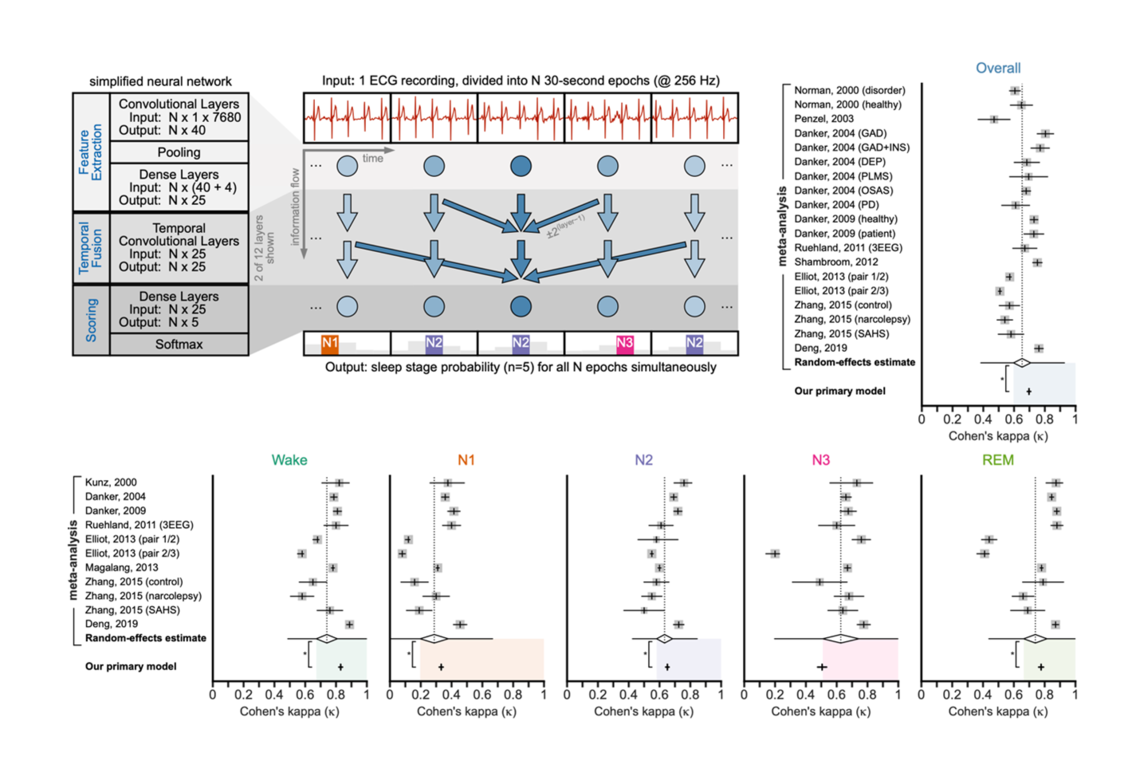Expert-level sleep staging using an electrocardiography-only feed-forward neural network
Overview
Our neural network can score sleep using a single lead of ECG data at an equivalent performance to expert human-scored PSG. It was trained and evaluated on 4,000 recordings from subjects 5 to 90 years old.
What was the approach or how does the tool work?
The neural network was designed with the intention of testing if cardiosomnography (an ECG-only sleep study) could complement or replace polysomnography (PSG). It takes a recording of ECG lead I data (the limb lead across the heart) recorded or resampled at 256 Hz as input. With that, it will score all 30-second epochs simultaneously—or, in the alternative configuration, in real time. Regardless of the configuration, the scoring performance is equivalent to human-scored PSG.
How can researchers use/benefit from the tool?
Researchers could use this to score sleep where they have ECG data but may not have—or want to collect—the full complement of PSG data. Numerous commercial devices (e.g., Apple Watch, Oura ring, etc.) and research projects have endeavored to find easier ways to score sleep without the cumbersome PSG setup. However, for 5-stage scoring, which is more difficult and rarely reported, their performance is at or below 70% of the current gold standard: human-scored PSG.
What NSRR data were used or how could the tool be utilized by researchers with NSRR data?
The training and evaluation of the network used 4,000 recordings from the following NSRR datasets: CCSHS, CFS, CHAT, MESA, and WSC. Also, data from MrOS was used to test if the network was learning any study-specific features. Researchers could also use ECG data from NSRR to score sleep stages for any datasets that don’t already have sleep scores.
Anything else to add?
We have released all of the code on GitHub so that others can start using this right away. Additionally, we mention in the paper a strong need for a standardized benchmark dataset for papers to compare their results against. We propose that the dataset we randomly sampled from the five NSRR datasets should become that benchmark and have documented which recordings were included (also on GitHub).
Resources/multimedia
Paper: https://authors.elsevier.com/a/1j58I2OYd7gUK
Code: https://github.com/adammj/ecg-sleep-staging
Twitter: @adamjonesname
Below is a simple picture of the network and the meta-analysis comparisons:
Guest Blogger
Dr. Adam M. Jones
Paper Authors
Adam M. Jonesa , Laurent Ittia , Bhavin R. Shethb,c
a Neuroscience Graduate Program, University of Southern California, Los Angeles, CA, USA b Department of Electrical & Computer Engineering, University of Houston, Houston, TX, USA c Center for NeuroEngineering and Cognitive Systems, University of Houston, Houston, TX, USA
Reference
Jones, A. M., Itti, L., & Sheth, B. R. (2024). Expert-level sleep staging using an electrocardiography-only feed-forward neural network. Computers in Biology and Medicine, 176, 108545. https://doi.org/10.1016/j.compbiomed.2024.108545
